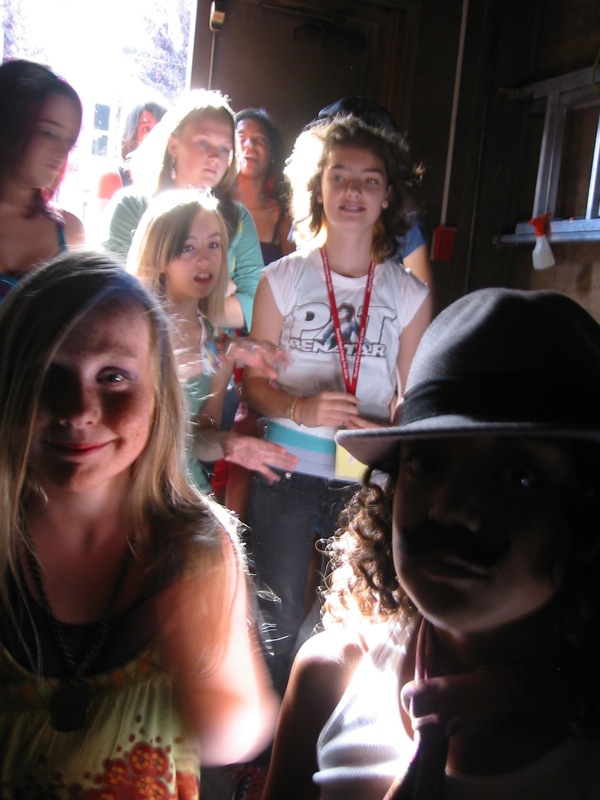
The disparity between
Wordstock's graphic identity--clean, modern, minimalist, W+K-designed--and the actuality of its existence in the airless, windowless, mauve caverns of the Convention Center is what I imagine one experiences upon meeting an internet date. On the other hand, along with the awkward and dull parts of the date, Wordstock did yield worthy moments of insight and wit, and I saw a lot of friends there, reading and volunteering and vending and mingling.
(I have never been on an internet date so I actually have no authority to make this analogy.)On Saturday morning, I introduced
Douglas Wolk for his talk on comics. I realized, to my shock, that although I have seen Douglas sing karaoke 700 times, I have never seen him read. He was great! He did not read from the book, but instead delivered a long, loving, and thoughtful complaint titled "Why I Hate My Culture." Meaning comics culture, which has long had "an incestuous relationship between audience and medium." Still, he posits happily,
now is the Golden Age of comics.

"Nostalgia is poison," says Douglas, because it makes people misunderstand what makes the object of nostalgia
good. (Which made me think of "Asleep and Dreaming" by the Magnetic Fields: "I don't know if you're beautiful, because I love you too much.")
These podiums are not built for short types, i.e. women. Look: it's
Katha Pollitt in a box!

She could very well be wearing no pants.
I met up with my brother and we went to see
cartoonist
Matthew Diffee, who utterly stole the show with his
New Yorker rejects (and some accepted ones.)

On having his cartoon chosen for the groanworthy weekly
New Yorker caption contest: "It's kind of like getting accepted and rejected at the same time." Apparently they receive 9,000 caption entries per contest, and they have a computer program that groups all the like captions together. Thus did no fewer than 25 people come up with what had roughly been Diffee's original caption to his cartoon.
(Tip: click here to learn the perfect answer every time.)
Cartoon editor Bob Mankoff (looming behind Diffee on the screen) tells aspiring cartoonists, "The
New Yorker is open to anyone, the way the Yankees are open to anyone." Ten reasons cartoons get rejected: too lowbrow; too politically incorrect; too dark; too weird; too political; too difficult to get, and when gotten, not funny enough to justify the effort; too dumb; too bad; too dirty; all of the above. For all these reasons, the rejects he showed made me and Dan laugh falsetto-hard.
Note to
Taylor Clark: You do not need to say "quote" every time you're about to read dialogue. (As in, "The three of them wondered how long it could last. Quote: 'I had no idea if we would make it,' said John.")
Perhaps I was simply maxed out at this point, but I could hardly pay attention to the Dark Horse Comics panel on graphic novels with
Craig Thompson (
Blankets),
Shannon Wheeler (Too Much Coffee Man), and a
guy who draws superhero comics--except when doe-eyed Thompson, whose eyelashes were visible from a hundred yards, spoke. He was that example of the quiet person being the one you really listen to, because it seems to mean more. Scratch the "seems to"--he was just more interesting and reflective than his panelmates.
 Blankets
Blankets is about being raised in his fundamentalist Christian family in Wisconsin, and breaking from it. It is 580 pages long and excavates all sorts of family dirt.
MODERATOR: "Was that cathartic?"
THOMPSON: [
pause] "No."
I resist "catharsis" as an artistic trope so I was happy he said that.
Out with a bang:
Jon Raymond and
Tiffany Lee Brown read selections from the archives of
Plazm while a video of a pair of hands flipped through back issues on a screen behind them, and I felt surges of nostalgia for the '90s. Poison, I know! But I fully indulged.
 (Sitting next to Jon is Lidia Yuknavitch, who read a startling story that involved a bombing-orphaned girl watching a wolf chew off its own leg in the snowy woods.)
(Sitting next to Jon is Lidia Yuknavitch, who read a startling story that involved a bombing-orphaned girl watching a wolf chew off its own leg in the snowy woods.)













































